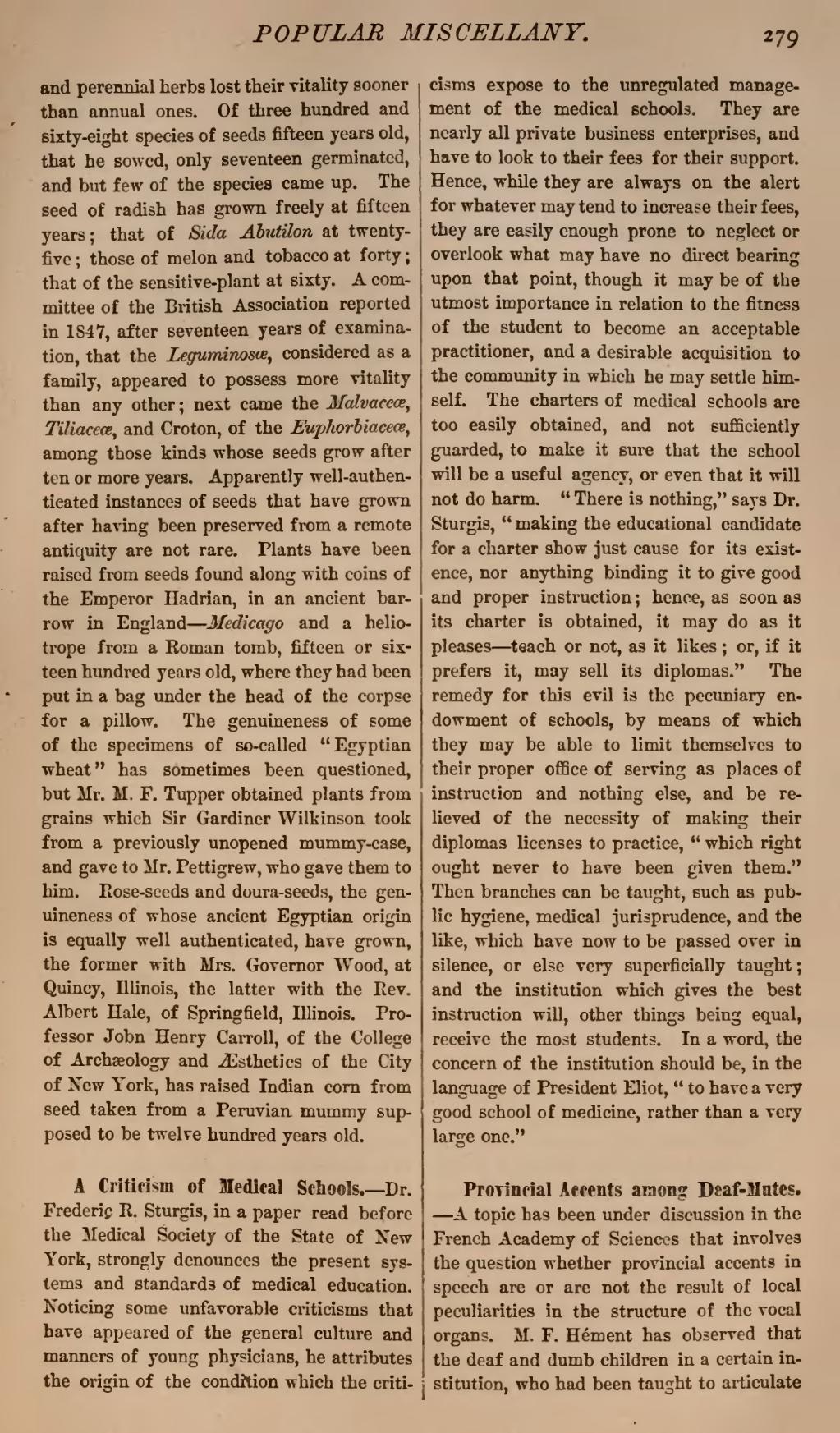and perennial herbs lost their vitality sooner than annual ones. Of three hundred and sixty-eight species of seeds fifteen years old, that he sowed, only seventeen germinated, and but few of the species came up. The seed of radish has grown freely at fifteen years; that of Sida Abutilon at twenty-five; those of melon and tobacco at forty; that of the sensitive-plant at sixty. A committee of the British Association reported in 1847, after seventeen years of examination, that the Leguminosæ, considered as a family, appeared to possess more vitality than any other; next came the Malvaccæ, Tiliaceæ, and Croton, of the Euphorbiaceæ, among those kinds whose seeds grow after ten or more years. Apparently well-authenticated instances of seeds that have grown after having been preserved from a remote antiquity are not rare. Plants have been raised from seeds found along with coins of the Emperor Hadrian, in an ancient barrow in England—Medicago and a heliotrope from a Roman tomb, fifteen or sixteen hundred years old, where they had been put in a bag under the head of the corpse for a pillow. The genuineness of some of the specimens of so-called "Egyptian wheat" has sometimes been questioned, but Mr. M. F. Tupper obtained plants from grains which Sir Gardiner Wilkinson took from a previously unopened mummy-case, and gave to Mr. Pettigrew, who gave them to him. Rose-seeds and doura-seeds, the genuineness of whose ancient Egyptian origin is equally well authenticated, have grown, the former with Mrs. Governor Wood, at Quincy, Illinois, the latter with the Rev. Albert Hale, of Springfield, Illinois. Professor John Henry Carroll, of the College of Archæology and Æsthetics of the City of New York, has raised Indian corn from seed taken from a Peruvian mummy supposed to be twelve hundred years old.
A Criticism of Medical Schools.—Dr. Frederic R. Sturgis, in a paper read before the Medical Society of the State of New York, strongly denounces the present systems and standards of medical education. Noticing some unfavorable criticisms that have appeared of the general culture and manners of young physicians, he attributes the origin of the condition which the criticisms expose to the unregulated management of the medical schools. They are nearly all private business enterprises, and have to look to their fees for their support. Hence, while they are always on the alert for whatever may tend to increase their fees, they are easily enough prone to neglect or overlook what may have no direct bearing upon that point, though it may be of the utmost importance in relation to the fitness of the student to become an acceptable practitioner, and a desirable acquisition to the community in which he may settle himself. The charters of medical schools are too easily obtained, and not sufficiently guarded, to make it sure that the school will be a useful agency, or even that it will not do harm. "There is nothing," says Dr. Sturgis, "making the educational candidate for a charter show just cause for its existence, nor anything binding it to give good and proper instruction; hence, as soon as its charter is obtained, it may do as it pleases—teach or not, as it likes; or, if it prefers it, may sell its diplomas." The remedy for this evil is the pecuniary endowment of schools, by means of which they may be able to limit themselves to their proper office of serving as places of instruction and nothing else, and be relieved of the necessity of making their diplomas licenses to practice, "which right ought never to have been given them." Then branches can be taught, such as public hygiene, medical jurisprudence, and the like, which have now to be passed over in silence, or else very superficially taught; and the institution which gives the best instruction will, other things being equal, receive the most students. In a word, the concern of the institution should be, in the language of President Eliot, "to have a very good school of medicine, rather than a very large one."
Provincial Accents among Deaf-Mutes.—A topic has been under discussion in the French Academy of Sciences that involves the question whether provincial accents in speech are or are not the result of local peculiarities in the structure of the vocal organs. M. F. Hément has observed that the deaf and dumb children in a certain institution, who had been taught to articulate

